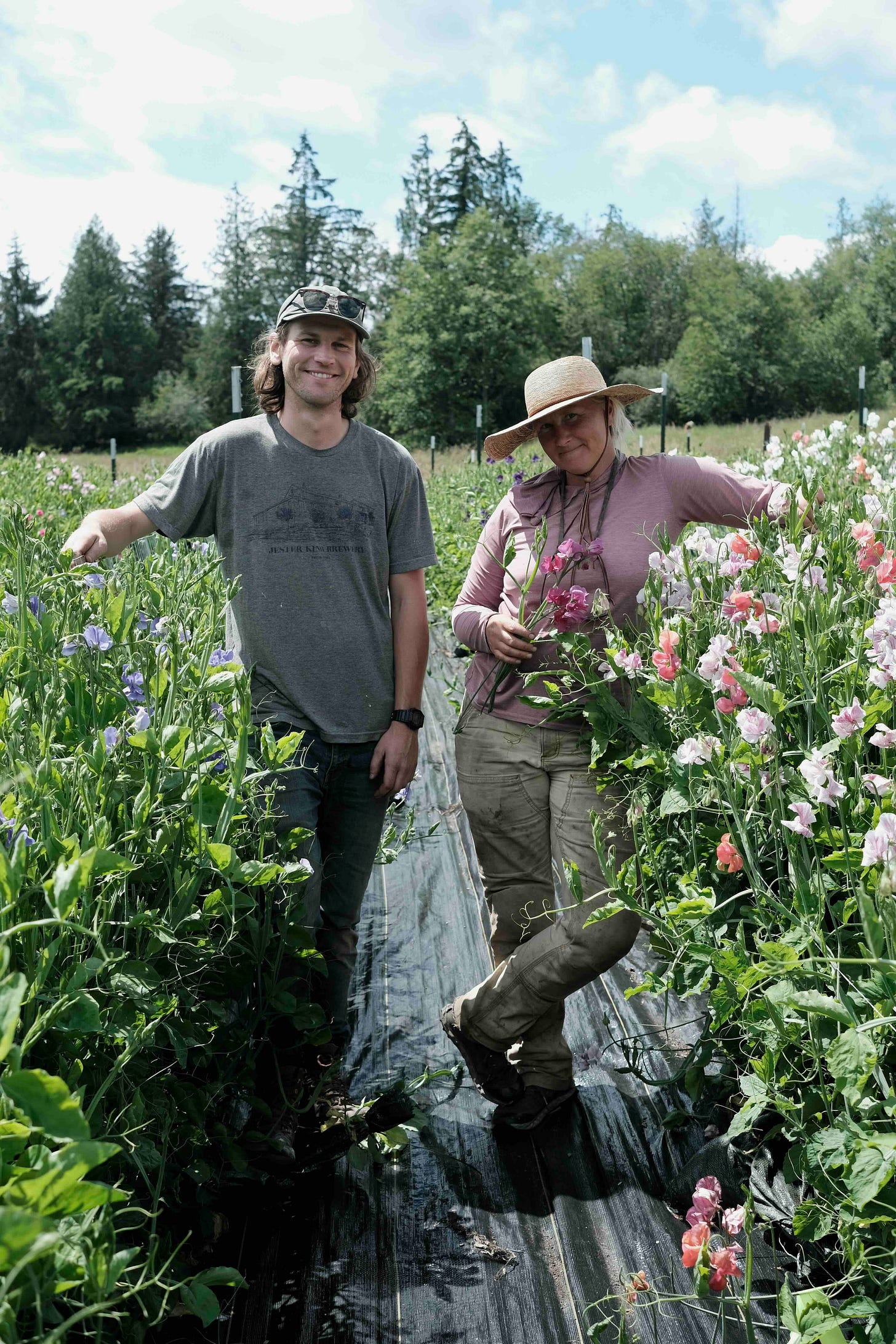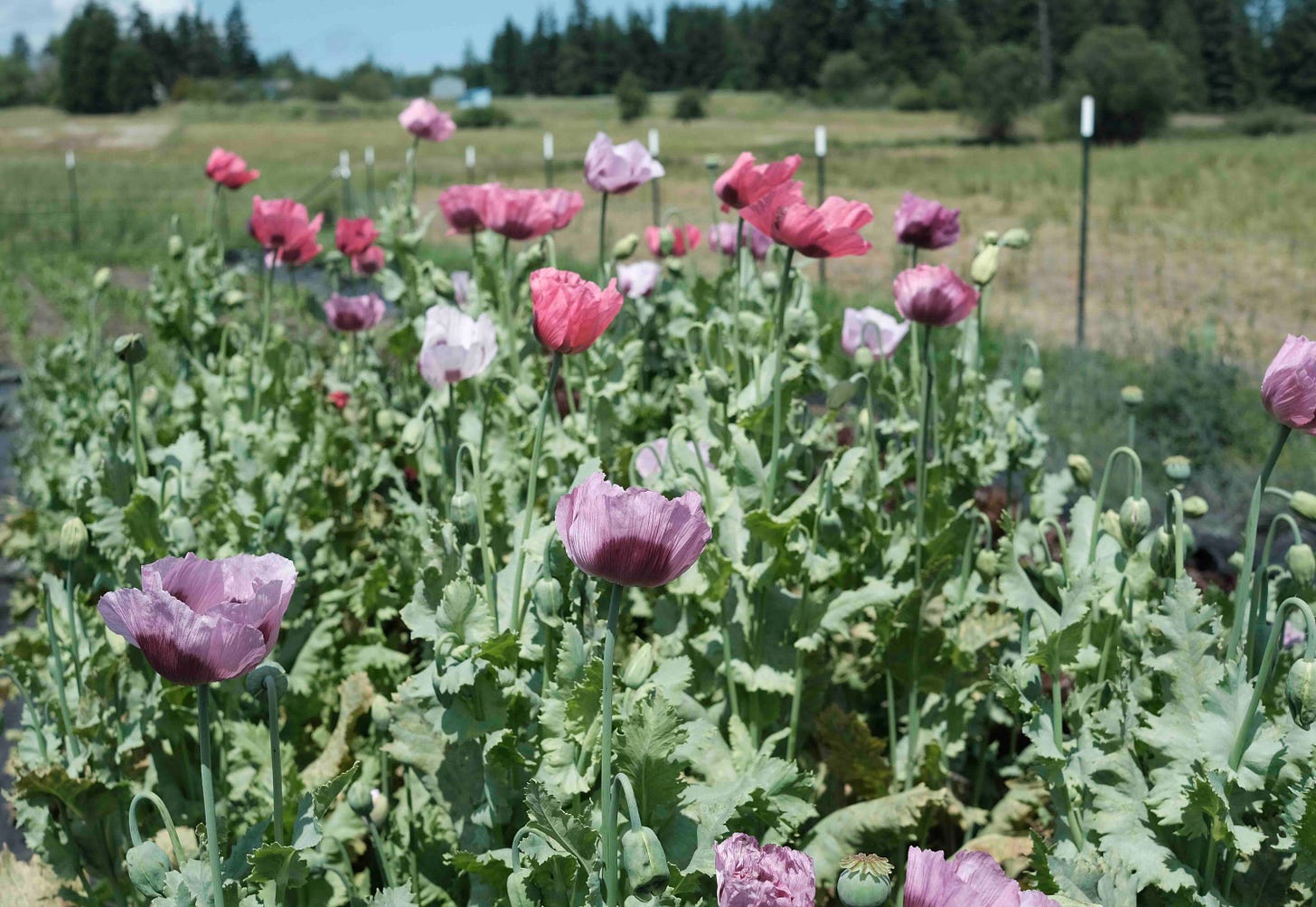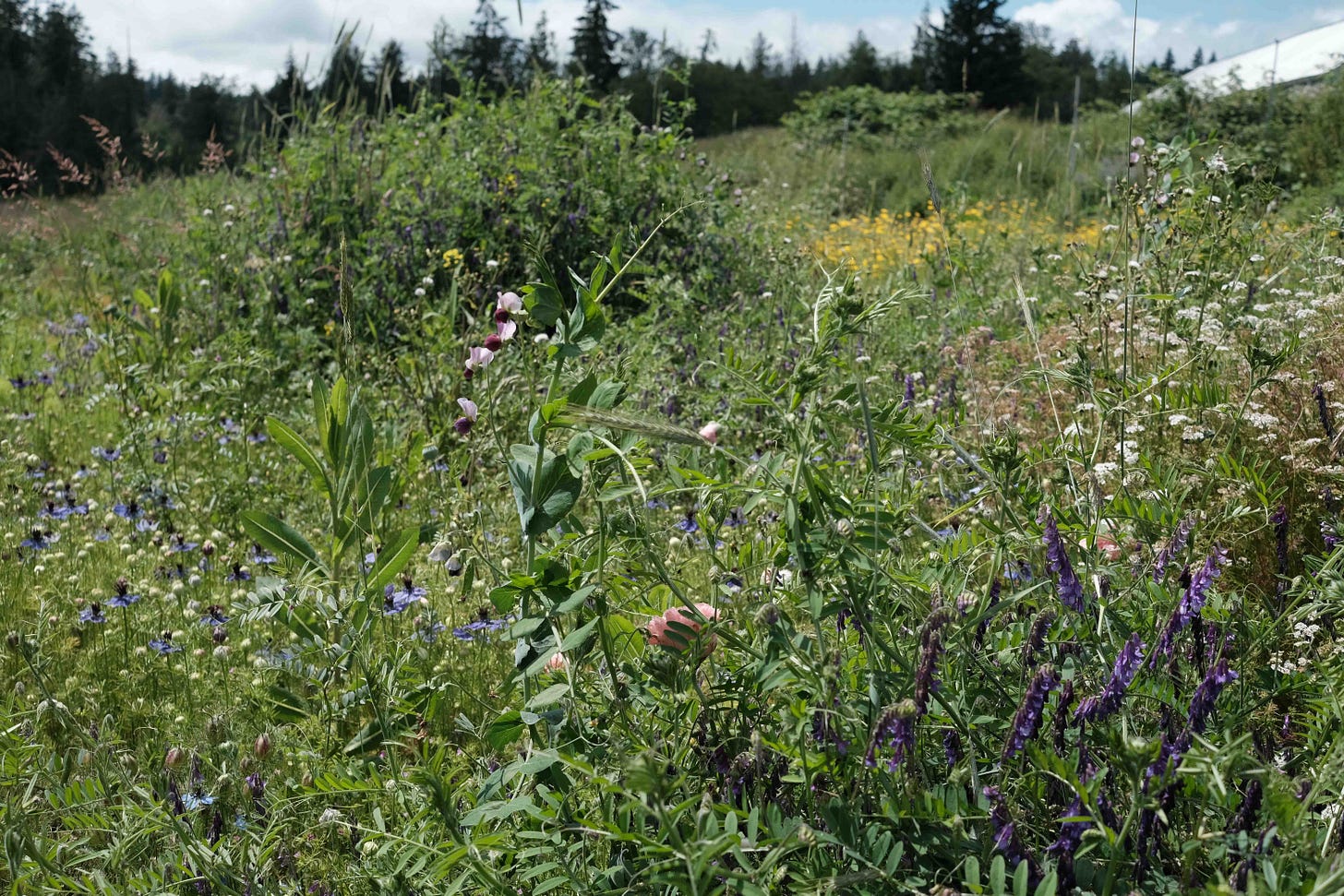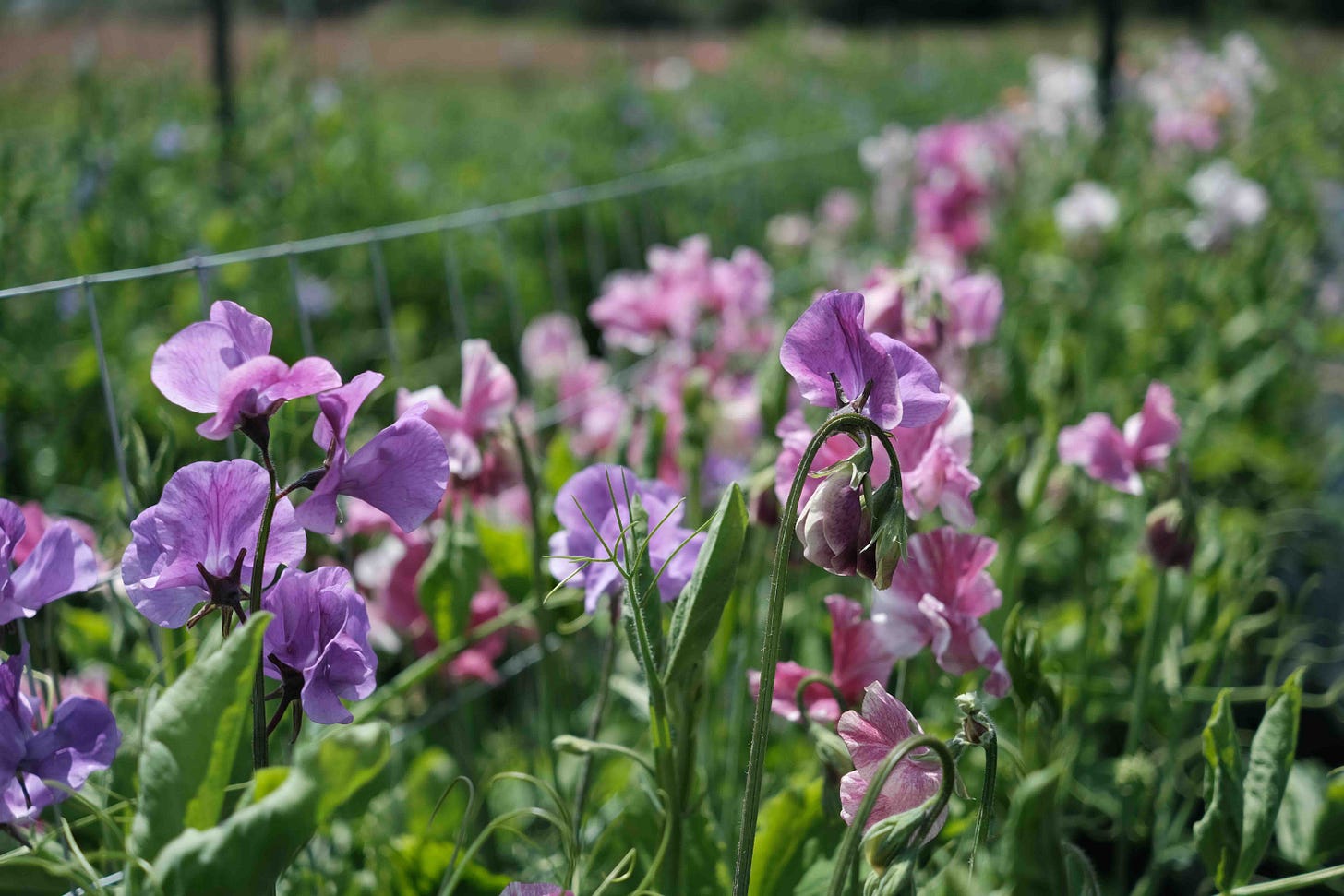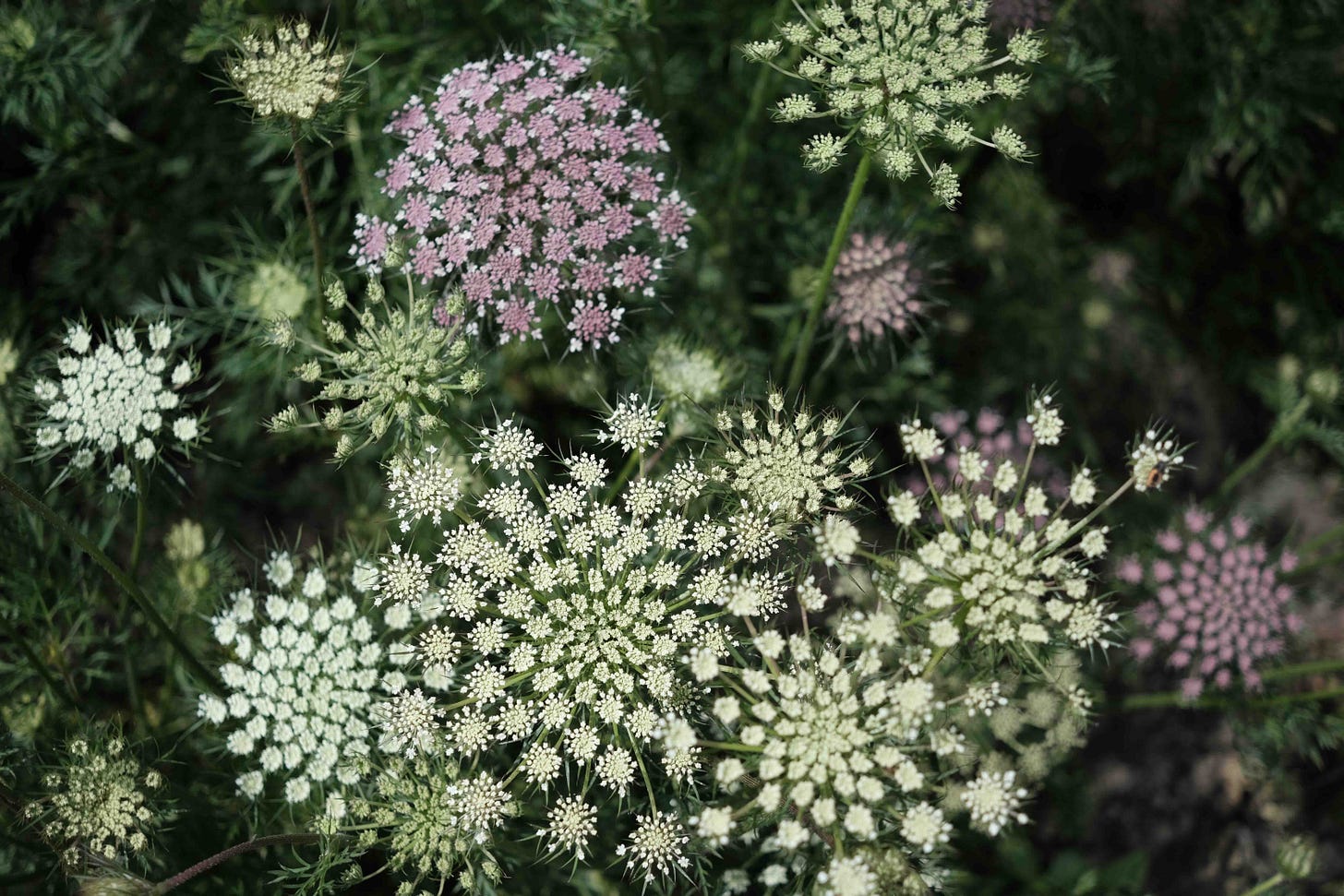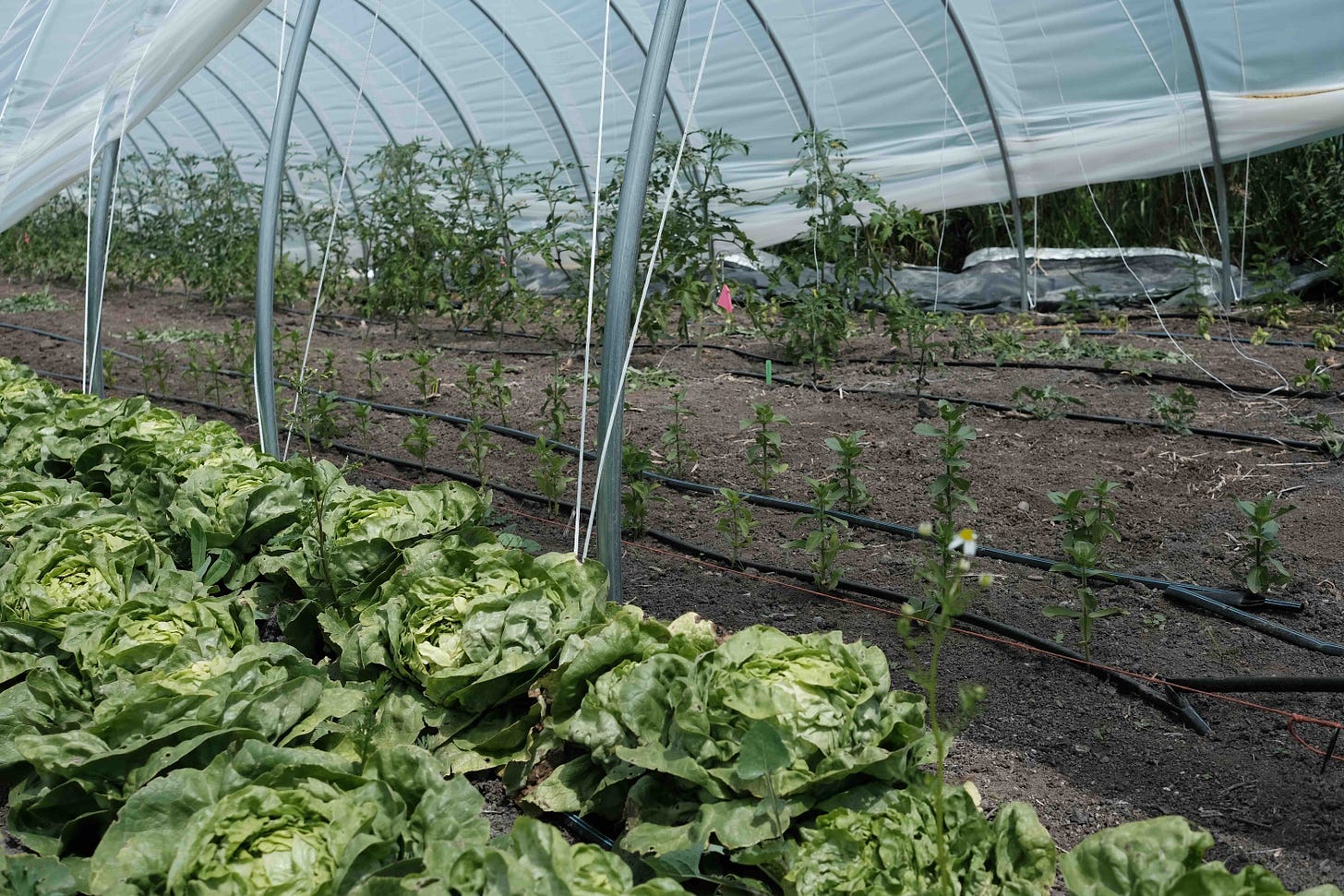I arrived in Port Townsend after a long drive up from Oregon along the beautiful coast roads of the Olympic Peninsula. I am being hosted during my time here by Micaela Colley from the Organic Seed Alliance. OSA are based out of Port Townsend, and have been leading in education, research and seed advocacy for the past 20 years (more on OSA to follow). As well as spending time with OSA, I will be visiting many other people involved in the seed network while here in Washington State.
My first visit was to Saltwater Seeds in the Chimacum Valley – a collaborative partnership between farmers Katie, Sam and Joanne. Saltwater Seeds are a relatively new seed company. Both Katie and Sam have worked at OSA in the past, and are experienced farmers and seed growers. Joanne was off site the afternoon I visited, but Katie and Sam kindly gave me a tour and shared their story.
Saltwater Seeds are committed to community, and to finding, selecting and stewarding varieties that are delicious, beautiful and well adapted to their maritime climate. It quickly became clear that this was the first seed farm I had visited that had very similar climactic conditions to home. Tomatoes can’t easily be grown without protection here because of late blight, and moisture levels year-round provide numerous challenges to getting plants through their life cycle and for drying down seed crops. To grow resilient crops that will tolerate these conditions, they rely on the diversity within the varieties, and also on some population breeding.
Diversity is a big thing at Saltwater Seeds. It was exciting to see several populations in the field – from a long running storage onion grex that they have been developing, to an ‘accidental’ poppy population that provided bursts of colour on the sunny July afternoon. Chatting to Katie and Sam, they couldn’t comprehend doing the work they do without access to heterogenous material. They try to breed for a wide variety of climate events, having seen swings in their own climate over recent years. Like others I had visited, Katie views our rapidly changing climate as an important selection opportunity for farmers - ‘extremes are selection events’ - but she also acknowledges that the current agricultural system isn’t set up to support this. ‘You have contract growers that can’t harvest their chard because 90% of it died over winter and they can’t justify the expense of weeding it and irrigating it for the rest of the summer. If there was a way for us, us as a culture or civilisation, to compensate those growers and allow them to let those crops that would otherwise be a complete loss go to seed, and make that selection, I think we could be making some major headway with climate resilience. We already have growers who are growing all of the most important food crops, it’s just a matter of figuring out it’s not just the breeders who are making those selections.’
Adaptation to this region and taste are both high on their selection criteria. Although a fairly new company, Saltwater Seeds already have over 130 varieties in their catalogue. They mostly cater for home gardeners, and this gives them a fair amount of leeway in terms of acceptable diversity within their crops. Their customers don’t necessarily require that ‘all important’ uniformity that our current agricultural supply chains so often demand. Saltwater Seeds sell the majority of their seed packets through local stores, unusually for a seed company these days, only a small percentage of their sales are via their online store. This means their seeds are truly regional – they are predominantly grown, sold, and regrown here on the Olympic Peninsula. They grow their seed crops across multiple sites - as tenants rather than landowners this is part out of necessity, part for isolation purposes. But as a collaborative it works well, with each team member filling a niche in terms of their role within the business and taking responsibility for different jobs at each site.
As we walked the field, I asked Katie about soil health - I had noticed that they didn’t seem to cultivate, and she explained this particular piece of land had never been cultivated in the time they had been there. They use a rotation of cover crops for fertility and then terminate and use tarps to cover the beds in late winter before planting in spring. This keeps the jobs at human scale, but also is more in keeping with how they would like to treat the land, with respect and little disturbance. Aside from cover crops they use minimal inputs - just selecting from what survives and thrives. Not content with experimenting with their varieties, they also play with diversity within these cover crops – creating elaborate and beautiful mixes to build soil health and attract a huge community of insects and wildlife. They even save seed from these when they can.
Their love of their work was tangible. Both Sam and Katie excitedly talked me through various varieties they were stewarding – from the ‘Fantasia’ carrot population – originally part of Micaela’s work with OSA, then selected for flavour by students of a local elementary school – to Maritime melons, to a local Puget shelling pea gifted to them by Tessa Gowan of Seed Dreams. As we wandered row upon row of their sweet pea crops, Katie talked of potentially starting another breeding project – making some deliberate crosses of their favourite varieties. They often get off types appearing, and both Katie and Sam delighted in the possibilities these accidental crosses presented.
Sam: ‘This time of year gets surreal, just look at this place it’s crazy!’
Katie: ‘It’s what gets me going! It’s the thing, the reason we do this thing, is to be able to interact with the plants and find and steward diversity.’
Sam: ‘I think our brains are wired to do this, we’re all like - this is special! Or this tastes really good! - lets keep doing that. Diversity is highly important, it’s the necessary piece to get the resilience factor. It’s how you’re going to create something that’s going to be flexible, and tolerate whatever’s coming. And I think it’s just more fun, its more enjoyable work, as opposed to things without diversity!
Katie: ‘Sometimes we buy seed and grow out a variety and that’s what we do, but it’s not my favourite thing to do. We just do it because people need to be able to buy certain varieties – Dark Star for example – it’s a great variety of zucchini. It’s a good example, it doesn’t need improvement, it’s awesome. But, I just think there’s something quintessentially human about being able to interact with the plants in that way (through selection), it’s like dancing.’
Relationship and the people element plays a big role in their business, from consciously sharing their work with their local community, to making an effort to keep everything at human scale at the farm, using minimal machinery to ensure they maintain that strong relationship with their crops. As a collective, they also recognise the benefit of having many eyes observing each plant, and we all agreed that we need many many more people doing this vital work.
Katie: ‘Diversity of people is so important. What I am drawn to could be totally different to what someone else is drawn to. So having as wide a range of people working on these things is going to give us a much wider range of things that people love and care for and steward.’
I absolutely loved my afternoon at this beautiful and abundant farm. Sam, Katie and Joanne are inspiring seed stewards, and are embracing all the joy that can be found in the critical work that they do.
In this time of crisis and unrest, all of the amazing seed companies I have visited so far on this journey bring me so much hope. As they summarise eloquently on their website, Saltwater Seeds ‘envision a world where agricultural work is valued as the essential work, of a vibrant agricultural community, thoughtful farmers, engaged farm workers, longtime residents supportive of small-scale, local farming, and a willingness to continually question the role of agriculture in colonial imperialism, unequal land access, and institutionalised racism. Together we are envisioning and enacting systems that will become more just.’




